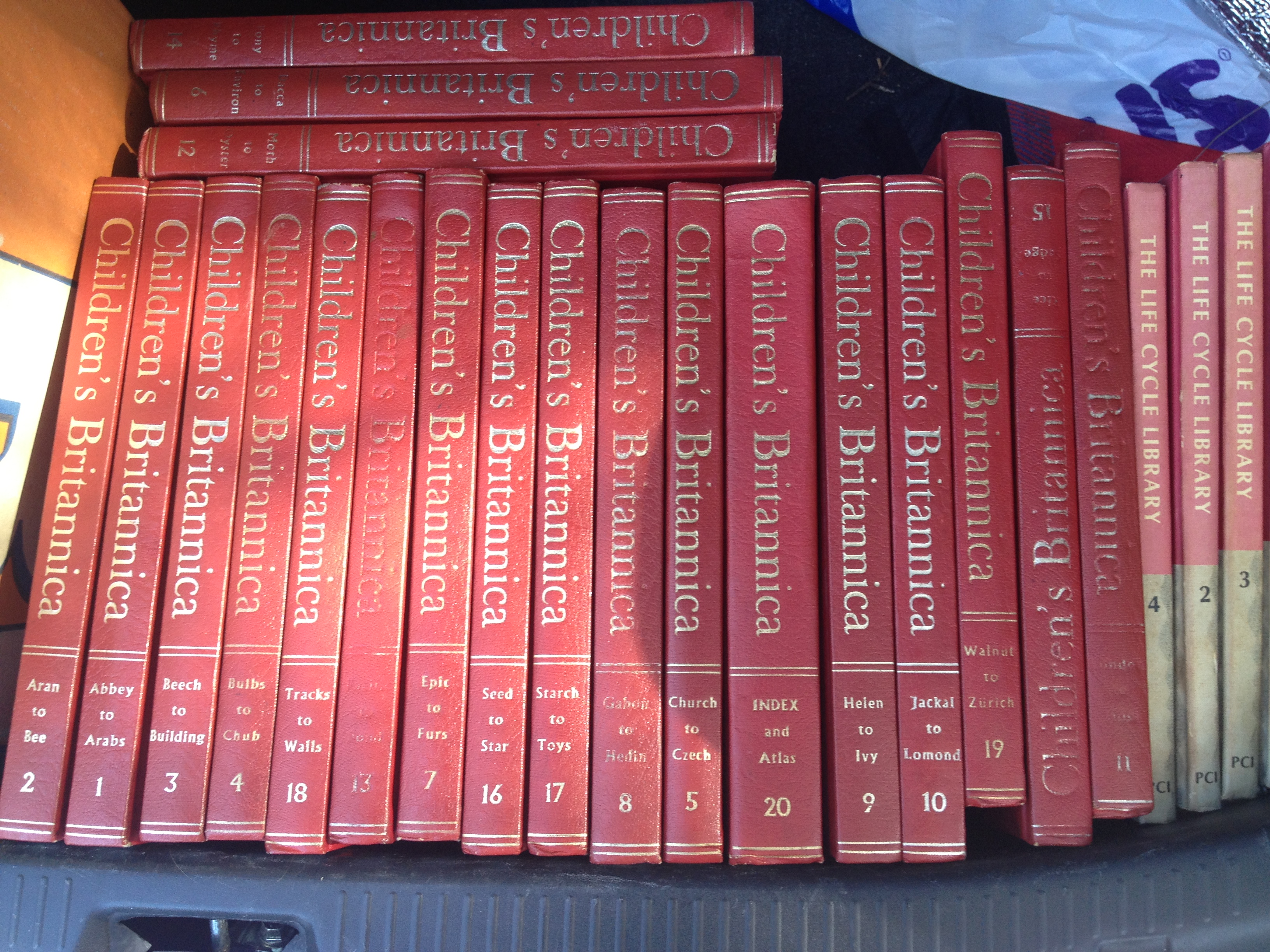As many of us look through our resource collections in
our school libraries, we have realized that they are far from meeting the minimum standards for school library collections as recommended in Achieving Information Literacy (Asselin et al., 2006). While this is certainly in part due to low
budgets and unrealistically high standards, the recent increase in emphasis on electronic resources has spread what meager budgets are available to school libraries even thinner. With all the shiny, new electronic resources available, physical resources have often become neglected and outdated.
 |
| A set of Children's Encyclopedia Britannica published in the 1970s. Image copyright questionsforus.com |
New digital resources are coming out every day, and there's no denying that digital resources have certain advantages over physical resources: many are kept up to date
as new information becomes available; they can be used by several people at once; in some cases, digital resources include multimedia components, making them more interactive and engaging. However, there are some huge disadvantages to digital
references that we shouldn’t overlook. We have all experienced broken links to
websites - in an embarrassing personal example, links I had provided in a legal
document led to a hacked website that had been replaced with pornographic
images.
The greatest disadvantage to digital resources is that they
can only give us what we ask for. As Riedling et al. (2013) describe, there is
an art to digital searches, and we spend much of our time perfecting our search
criteria. Even with the amount of support we as educators give our students during this learning process, search engine optimization is not an intuitive skill and instead is one that can take years to master. I have seen students paralyzed in research projects as they can't even figure out where to start looking. Books, on the other hand, can be chosen based on larger categories of information and skimmed to find relevant material. Tables of contents offer helpful hints as to how topics can be narrowed down.
As we learn to use search engines online, they are also learning
about us. In particular, online search engines such as Google use machine learning to characterize us
based on our search history, what we click on, etc. Google will return results that fit in with what we
have searched in the past, showing us what we may already know or agree with. By only finding what we seek, we leave ourselves closed to the unexpected. It has been often said that we can't imagine what we can't imagine - in other words, we don't know what information we are missing.
 |
| Cover of Bruce Clay's Search Engine Optimization for Dummies. |
MinuteVideo's Filter Bubbles and Echo Chambers. Retrieved from https://www.youtube.com/watch?v=Zk1o2BpC79g
While digital references play an important role in our school library collections, we can't ignore the humble book. I have often found surprising information while perusing a book on a topic of interest and I would hate to deny this experience to the younger generation. We need to keep a well-curated selection
of books and other physical references in our libraries and teach our
students to use them effectively.
References:
Clay, B. (2015). Search Engine Optimization for Dummies. John Wiley & Sons.
MinuteVideos (2016). Filter Bubbles and Echo Chambers. Retrieved from https://www.youtube.com/watch?v=Zk1o2BpC79g
Question For Us (2012), Physiology. Retrieved from https://questionsforus.com/tag/childrens-encyclopedia-britannica/
Riedling, Ann, Reference skills for the school library media specialist: Tools and tips, (Third Edition). Linworth.
Rowe, Kevin (2018). How Search Engines Use Machine Learning: 9 Things We Know For Sure. Retrieved from https://www.searchenginejournal.com/how-search-engines-use-machine-learning/224451/
References:
Asselin, M., Branch, J., & Oberg, D., (Eds). (2006).Achieving Information Literacy: Standards for School Library Programs in Canada. Ottawa, ON: Canadian School Library Association & The Association for Teacher-Librarianship in Canada.
MinuteVideos (2016). Filter Bubbles and Echo Chambers. Retrieved from https://www.youtube.com/watch?v=Zk1o2BpC79g
Question For Us (2012), Physiology. Retrieved from https://questionsforus.com/tag/childrens-encyclopedia-britannica/
Riedling, Ann, Reference skills for the school library media specialist: Tools and tips, (Third Edition). Linworth.
Rowe, Kevin (2018). How Search Engines Use Machine Learning: 9 Things We Know For Sure. Retrieved from https://www.searchenginejournal.com/how-search-engines-use-machine-learning/224451/
Well done reflection on the big ideas and key concepts from our first theme. I was shocked to read about your own personal example of legal document links being hacked! That would be a nightmare, and is a real reminder that links are fleeting and transitory and are not equivalent to books on a shelf for many comparisons. A few more connections to specific new learning, or discussion of the specific research models from our course texts would be useful. Overall, a strong reflection on the most important aspects of information services and information literacy.
ReplyDeleteHi Aaron,
DeleteThank you so much for the feedback. I appreciate your input.
The hacked links was a real eye-opener for me. I was really embarrassed when my lawyer messaged me to say I had linked her to dirty content!
Hi, this is Pam from your LIBE 467 class. You bring up some very excellent points about the merits of the book. I think it is important to have both skills of how to research using books and technology, but there are downsides and upsides to both. Your personal story sounds terrible! It is a very good example of one of the worst things that can happen with technology. It is definitely important to teach the dangers of technology so students are aware. Thanks for sharing!
ReplyDeleteI think the two compliment each other really well. But that just adds another skill we need to teach/learn - knowing when to choose which one.
Delete